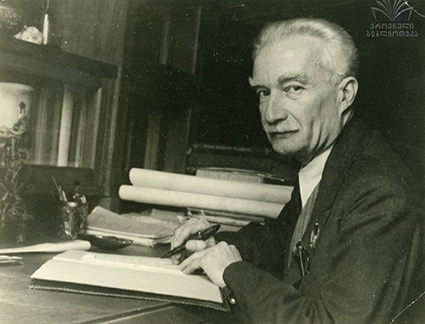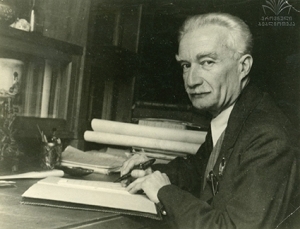Ivane Javakhishvili Remembered
This week sees the 140th anniversary of the birth of great Georgian scholar, Ivane Javakhishvili, founder of the Tbilisi State University, to be commemorated in the National Academy of Science of Georgia.
It is one hundred and forty years since the birth of Ivane Javakhishvili (1876-1940). This hardworking citizen, scientist and scholar throughout his life travelled a very hard yet successful road that was full of risk. He is a unique phenomenon in the history of Georgian public life for his example of patriotism, deep scientific research, and respect for his contemporaries. The scholar studied and contributed greatly to the development of the following: the history of the Georgian nation, the history of the Georgian economy, the history of Georgian law, Georgian palaeography, historical geography, metrology, numismatics, the history of music, construction work and, generally, the issues of history of material culture. In the early 20th century, Javakhishvili took it upon himself to continue the work of Ilia Chavchavadze, to add to the progress of the cultural life of the Georgian nation. The first step was to plan the foundation of the first top educational hearth in Georgia – a university - and so begin a new period in Georgian history.
In 1914, the government passed a law allowing the establishment of non-Russian language private universities. Javakhishvili and his supporters were encouraged by this fact. The great scholar had clear aims: “the university simultaneously should be an institution of scientific research and experiments and one in which the study of science and the methods and practices of scientific work can be learned.”
A university government was chosen and Ivane Javakhishvili was asked to be Rector. However, he refused, in his place suggesting Petre Melikishvili, “a scholar well-known in both Russia and elsewhere” and telling them that “his election [to the position of Rector] will be a great prestige for our university.”
His suggestion was well-received by the university professors and on 26 January, 1918, the day of commemoration of David the Builder, the Tbilisi State University was opened and Javakhishvili was chosen to head the Department of History of Georgia.
Yet demand was such that, on 24 December, 1919, Ivane Javakhishvili did accept the role of University Rector, a position he kept until 1926 when he was forcible removed from both position and university as a result of the anti-Soviet August Uprising of 1924 following which tolerance of non-Marxist intellectuals had gained fervour. He escaped the worse fate suffered by his successors, however. The rectors that followed Javakhishvili- Tedo Ghlonti, Malakia Toroshelidze, Ivane Vashakhmadze, Levan Aghriashvili, Karlo Oragvelidze, Aleqsandre Erqomaishvili- all of whom served the university faithfully, were sacrificed to the existing political regime and were shot in 1937-1938.
Throughout his life Javakhishvili wrote more than 170 works which dealt with various aspects of Georgia’s political, social, economic and cultural history. His main work, ‘A History of the Georgian Nation,’ published in 1908, has remained one of the most comprehensive and eloquent treatments of pre-modern Georgian history. Regrettably, it has yet to be translated into other languages.
On 18 November, 1940, the Georgian scientific community gathered to listen to Ivane Javakhishvili’s lecture. His topic, “philological science goals and the Georgian literary monument,” was seen as an important one. He began speaking at the appointed time, but sadly never reached the end of his lecture- his heart stopping mid-speech. Georgian historian, philologist, and sociologist Mikheil Tsereteli, who was in Paris at the time, sent a message of condolence: “Rest in peace, great Ivane, with those also adorned with the crown of contribution and martyrdom, as you are. You must lie beside the great Ilia, who took such a crown before you.” Javakhishvili was, however, buried in the garden of the university of his founding, his duty to his homeland well-fulfilled, his name to go down with the many greats of Georgian history.
Anano Modebadze












